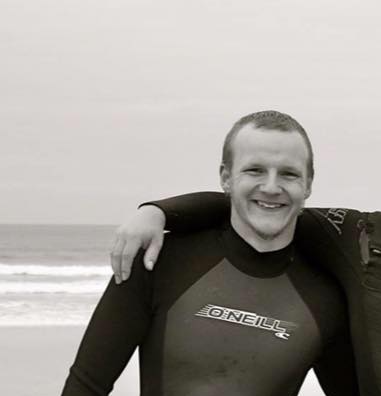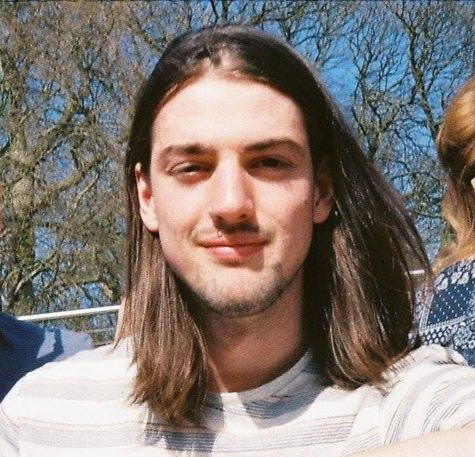)
Left: Hugo Douglas-Deane. Right: Thomas Panton
Hugo Douglas-Deane graduated from UEA in 2017 with a BA in English Literature and Thomas Panton graduated in 2018 with a BA in International Relations and Politics. Thomas is now back studying at UEA for a MSc in Climate Change and International Development (now MSc Climate Change and Global Development).
Together, they founded Canopey – an ethical marketplace (formerly Greenr). They both talked to us recently to explain exactly what Canopey is and how UEA helped them to start a business.
[The best thing about my time at UEA was] meeting people with the same fire in their belly for change.
Describe Canopey and what inspired you to create it.
Thomas: We know people want to buy better, but right now it’s a super confusing and difficult experience trying to shop sustainably. I worked for Greenpeace for the better half of a decade as a speaker and fundraiser, and constantly had people telling me they wanted to make more ethical choices but didn’t know where to go.
I started Canopey.com (formerly Greenr) together with my co-founder Hugo, with our joint vision to create a relatable and accessible home for better impact shopping and living. We bring trusted, sustainable brands together on to one platform, across a range of categories including fashion, beauty, and cleaning products. But we’ve gone a step further, creating our Impact Calculator to show you the carbon emissions, water and plastic waste you can save by choosing our products over the mainstream options. It makes it really easy to see how something is greener at a glance and over time you can see your positive impact add up.
Ease of use and range of products is clearly very important. How difficult has it been to find a way to host so many products, and how have you got so many brands on board?
T: We’ve been working hard for more than a year to build a very strong proposition and reputation in the industry. I think the 130+ brands we already have signed up recognise everything we’ve done so far and are excited by our mission to build the home for better buying and living.
H: We’re also very focused on building a strong community for our brands. We’re all working towards the same goals, so it’s a no-brainer for us to help each of them grow their businesses and improve their sustainability credentials.
You started off with funding from UEA and now you’re reaching out to investors all over the world. What have you learnt about funding and starting up a business?
H: Every investor is different – one may only be interested in the founding team, and one might just want to look at your numbers. But the one thing we are all united by is that we are human, so strong storytelling and getting people emotionally engaged and excited by what you’re doing cannot be understated.
T: One of the things that really sets us apart is our vision for the future, our tenacity at going after what’s currently wrong in the industry, and going further than anyone else to give transparency and trust to our customers. Investors love to see it, and know that no matter what’s thrown at us, we can deal with it. It’s the thing that will have them laugh at you, scoff at you, or get excited with you.
Part of sustainability efforts is about consuming less, but how much difference can we make by consuming better?
T: Consuming less is naturally part of the equation, and we’re big fans of secondhand and reuse at Canopey. This isn’t always an option though, and so the next best thing is to choose more sustainable products. And there’s a huge impact we can all have as individuals in choosing what we buy. From reducing waste water by choosing clothing made with better materials or swapping shower gel for soap bars, to less carbon-intensive manufacturing. And we all know that plastic is bad for the environment: it drives demand for the oil industry, and it outlasts us by hundreds of years, breaking down into micro plastics over time.
H: There are so many things to consider, which is why we built our Impact Calculator to help you see why a product is better, and give all our products clear labels to show whether it’s vegan, home compostable, refillable and much more.
 Thomas at UEA Surf Club
Thomas at UEA Surf Club
Are the solutions to climate change and sustainability challenges found within the business community as much as they are within science and governments?
T: It’s definitely a mix of all three. I currently study an MSc in Climate Change at UEA, so I know how important science and research is in this big puzzle. Without the tireless work of academics in this field (like those at the Tyndall Centre) we wouldn’t be talking about this today, and they definitely deserve more respect and recognition. That being said, after working for the world’s largest independent environmental organisation for nearly a decade, it’s clear that businesses can often move faster and take bigger risks. Within all of this though, it comes down to people, from the activists to the scientists, from the politicians to the entrepreneurs. All of us can get involved with some aspect of the movement and speed up its impact.
H: I worked in government communications for a number of years, so I know the amount of work behind the scenes that is required for things to change and this happens at quite a slow pace. Businesses also have a lot of power in translating that into relatable and accessible action for individuals, which is part of our mission with Canopey.
How did your studies at UEA influence your business?
T: My undergrad was in International Relations and Politics and I found myself constantly drawn to challenging the ‘discuss round a table’ mantra and to actually go out and get my hands dirty implementing real change. UEA was where I got introduced to the team at Greenpeace, it’s where I got involved with societies, and it's where I could learn from some of the smartest people in the world. Following this with an MSc in Climate Change and International Development is just a further extension of this learning and action, and massively contributes to the academic nature of our research and product offering.
H: It’s safe to say I wouldn’t be working in marketing if I hadn’t studied English Literature at UEA. I was creative writing editor at Concrete during my last year and was also one of the founding members of the Egg Box Publishing society, which is where I found my passion for what was essentially running a business. UEA opened my eyes to everything you can do with an English degree.
What are your favourite memories from studying at UEA?
T: It’s got to be meeting people with the same fire in their belly for change. You meet a lot of opinionated people in a politics degree, but it is the ones which were actually acting on their opinions and remaining humble which inspired me. I’m lucky to have been impassioned by some fantastic lecturers from Bob Stillwell in Utopias and Dystopias, to Alan Finlayson in Social Political Theory. Right now I’m mostly inspired by the wealth of knowledge and insight that each and every one of my course leaders has!
H: One of the things that drew me to UEA was the campus itself. Meeting people in the square or kicking a football about on the grass in front of the Ziggurats will always be highlights. My course was very interdisciplinary so I was able to work in photography, music and other ways of interacting with a written piece that extended out from the page itself. My favourite assignment was a written and photographic essay about the nature of living in cities. And of course, as an English student I used to absolutely love taking a break from essay writing to walk down the bookshelves in the library!
 Hugo while at UEA
Hugo while at UEA
What advice would you have for any students or graduates thinking of starting their own business?
T: Talk. To. People. About. Your. Idea. I cannot say this enough. There’s this huge fear that someone is going to steal your idea but the blunt truth is that if they steal it and make it a success then you weren’t the person to do it. It’s also way harder to steal an idea than it is to get involved in helping one. Everyone knows something you don’t, use that.
H: If you’re still a student, get involved in societies, which are like mini businesses themselves. Talk to the UEA Enterprise team who can help advise you and give support and mentoring. Talk to as many people as possible in the industry you want to work in. Look for other UEA graduates – that commonality often means they’ll be willing to help.
What is your ultimate ambition for Canopey?
H: We’re on a mission to make sustainable shopping mainstream, but there are so many solutions needed within the climate change movement, we’re never going to stop there!
T: A platform that makes sustainable living, living. We need to make it second nature to live in a better way. To do that, these issues need to be more understandable, accessible, and easy to adopt. We’re not just looking at shopping, we’re looking at impact data, renting, services, logistics, EdTech, charitable giving, and more. There’s such a huge opportunity to create a central platform that makes these things easier and more impactful, we can’t wait to get there. But right now, we’re focussed on making it easy to Bin B*zos and Buy Better.
Thomas studied International Relations and Politics at UEA. Hugo studied English Literature.

)